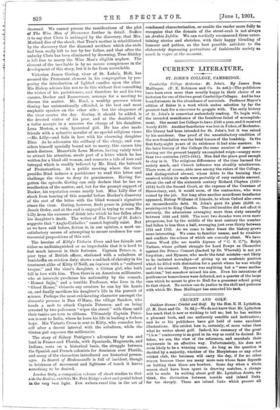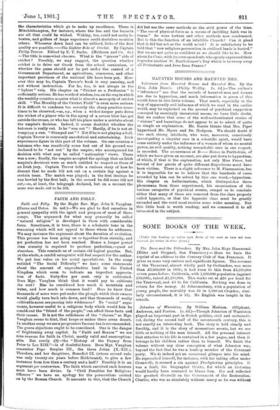CRICKET AND GOLF.
Outdoor Games : Cricket and Golf. By the Hon. R. H. Lyttelton. (J. M. Dent and Co. 7s. 6d.)—We do not know that Mr. Lyttelton has much that is new or striking to tell us; but he has written a pleasant book, and one uniformly sensible and instructive ; and he or his publishers have got hold of some excellent illustrations. His cricket lore is, certainly, of more value than what he writes about golf. Indeed, his summary of the great "1.b.w." controversy is as good in its way as could be desired. He takes, we see, the view of the reformers, and marshals their arguments in an effective way. Unfortunately, his does not seem likely to be a winning cause. As long as the question is decided by a majority, whether of the Marylebone or any other cricket club, the batsmen will carry the day, if for no other reason because there are many more men whose fame depends on batting than there are bowlers. Some day when a whole season shall have been spent in drawing matches, a change will be made. In writing about golf Mr. Lyttelton draws, we think, the distinction between seaside and inland links far too sharply. There are inland links which possess all the characteristics which go to make up excellence. There is Minchinhampton, for instance, where the lies and the hazards are all that could be wished. Woking, too, could not easily be beaten, and golfers of large experience could doubtless mention others. Wherever down land can be utilised, links of the first quality are possible.—The Lighter Bide of Cricket. By Captain Philip Trevor. Edited by E. T. Sachs. (Methuen and Co. (Is.) —The title is somewhat obscure. What is the " graver " side of cricket ? Possibly, we may suggest, the question whether cricket is to drive out Greek from the school curriculum, or whether the game should not be put under the control of a Government Department, as agriculture, commerce, and other important provinces of the national life have been put. How- ever this may be, Captain Trevor's book is very amusing, and not without instruction. For he, too, is not always in the " lighter " vein. His chapter on "Cricket as a Profession" is sufficiently serious. He has words of wisdom, too, on the way in which the wealthy counties acquire what is almost a monopoly of cricket skill. "The Morality of the Cricket Field" is even more serious. It is difficult to condemn too severely the sharp practice some- times to be observed,—as, e.g., when a wicket-keeper puts down the wicket of a player who in the agony of a severe blow has got outside the crease, or who has left his place under a mistake about the umpire's decision. Indeed, it seems doubtful whether the batsman is really out. Is he "run out " ? Hardly, if he is not at- tempting a run. "Stumped out " ? Not if be is not playing a ball. Captain Trevor is commonly anecdotical and entertaining. Irish experiences figure in this part of the volume. On one occasion a batsman who was manifestly some feet out of his ground was declared to be "not out" by the umpire, who accompanied his decision with what may be called " nationalist " views. There was a row; finally, the umpire accepted the apology that an Irish umpire's decisions were as much entitled to respect as those of an Irish jury. Captain Trevor tells a curious story of how he dreamt that he made 102 not out on a certain day against a certain team. The match was played; in the first innings he was bowled by the first ball; in the second he did score 102 not out,—so, at least, the telegraph declared, but on a recount the score was made out to be 103.







































 Previous page
Previous page